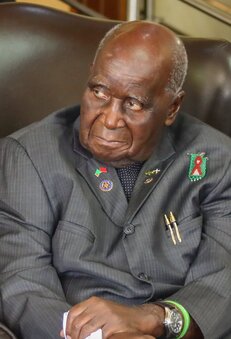 The First President of Zambia has Died Kenneth David Kaunda, the first president of Zambia, died 17 June 2021 aged 97. As he was Zambia’s first president, in office from 24 October 1964 to 2 November 1991, many are seeking to evaluate his legacy. The Family of Kaunda Kenneth Kaunda, or KK, as he was generally referred to, was born in Chinsali, Northern Rhodesia (now Zambia), 28 April 1924. His wife, Betty, who he married in 1946, died in 2012. They had eight children. Before entering politics, KK was a teacher. He was the youngest of eight children. His father was Reverend David Kaunda, a Church of Scotland missionary and teacher, who was born in Nyasaland (now Malawi). A Humanist in Africa KK wrote in his book A Humanist in Africa, that he could never agree with the Calvinist religion of his parents who believed in the depravity of man. KK asserted that he believed in the “goodness of man”. 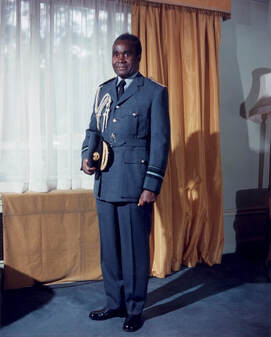 Socialist Humanism When he became president of Zambia, KK worked to promote socialist humanism as the ruling ideology of the country. Kaunda also used terms such as “Zambian Humanism” and “African Socialism”. One Party State After protests of corruption and vote rigging in the 1968 elections, Kaunda banned all political parties except UNIP (United National Independence Party). When there was a break away from UNIP by one of his members, Simon Kapwepwe, in 1972, to form the United Progressive Party, Kaunda moved to suppress it and changed the constitution to reduce Zambia to a one-party state. Dictatorship Thereafter Kenneth Kaunda was the sole candidate in future elections. All opposition was eliminated and a personality cult was built around Kenneth Kaunda. All internal dissention was suppressed, particularly in Western Zambia, in Loziland, formally known as Barotseland. 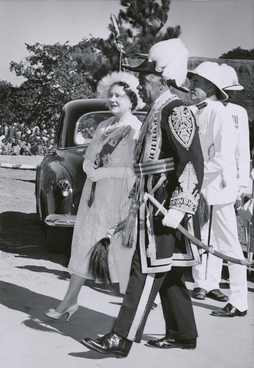 The Suppression of the Lozi in Western Zambia The Lozi king had requested Britain to make it a protectorate, with the stipulation that if the British ever left Northern Rhodesia, they would grant Loziland/Barotseland independence, separate from the rest of the country. The king of the Lozi was presented a black and gold British admiral’s uniform by King Edward VII in recognition of a treaty that have been signed between the Lozis and Queen Victoria. Unfortunately, however, the Lozi people were denied their independence and all attempts at self-determination by its peoples were suppressed by Kenneth Kaunda. KK suppressed the Lozi and placed Western Zambia under martial law. Making Zambia a Launching Pad for Revolutionary Insurgents KK was also famous for his hosting and active support of revolutionary guerilla movements aimed at overthrowing the neighbours of Zambia, including the FNLA, MPLA and UNITA targeting Portuguese West Africa (Angola), Frelimo, targeting Portuguese East Africa (Mozambique), ZANU and ZAPU, targeting Rhodesia and SWAPO, targeting South West Africa (Namibia). Escalating Conflicts As vast quantities of Soviet weaponry poured into Zambia to equip these insurgents, pre-emptative strikes brought suffering and disruption of roads, railways and bridges in Zambia. 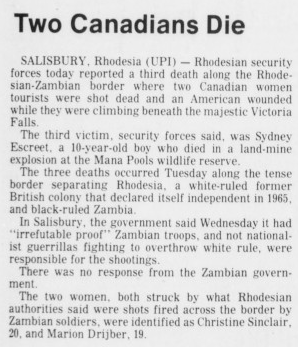 Murdering Canadian Tourists at Victoria Falls 16 May 1973, after KK had particularly worked up anti-white Rhodesian hysteria on state radio and TV, Zambian security forces shot two Canadian women dead across the Zambezi River at Victoria Falls. Christine Sinclair (20 years old) and Marion Drijber (19) both from Ontario, were tourists from Canada and it is not known what was done to deal with the individuals responsible. Aggressive Foreign Policy Kenneth Kaunda obtained sixteen MiG-21 jet fighter bombers from the Soviet Union. Kaunda pursued an aggressive foreign policy, promoting sanctions on Rhodesia (even while receiving electricity from the Rhodesian hydroelectric plant at Kariba). Hypocrisy and Counter Productive Economic Policies KK also campaigned for sanctions against South Africa (even while receiving vast benefits from South Africa including the maintenance of Zambian Airways and Zambian Railways. The migrant labourers from Zambia to South Africa also brought back hundreds of millions of dollars’ worth of income to the failing economy of Zambia). Even when Zambians needed snake bite serum, it came from South Africa. Yet, while Zambians ate mielie-meal grown in the Orange Free State, Kenneth Kaunda ranted against South Africa and against anyone who sought to trade with South Africa. 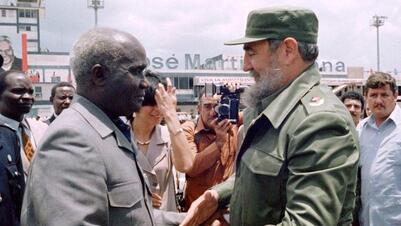 In The Frontline of The Cold War During the Cold War, Kenneth Kaunda maintained open, close friendships with Marxist dictators such as Josip Broz Tito of Yugoslavia, Nicolae Ceausescu of Romania, Fidel Castro of Cuba and with Brezhnev of the Soviet Union. Many of the streets of Lusaka were named after famous Marxist dictators, revolutionaries and terrorists. Autocratic Dictator of a One-Party State Kenneth Kaunda was autocratic. He personally appointed the Central Committee of UNIP. The Central Committee in turn nominated the sole candidate for the party presidency. Since all the members of the Central Committee had been appointed by Kaunda, he was always the sole candidate. All dissent was suppressed. Economic Collapse The media and industry was nationalized under Kaunda’s leadership and the economy collapsed. In Zambia at independence, one kwacha equalled one British pound. At the end of Kaunda’s reign, one pound equalled over 8,000 kwachas. At independence in 1964, you could buy a car for about K140. By the end of Kenneth Kaunda’s reign, a bottle of Coca-Cola could cost over 1,000 kwachas! 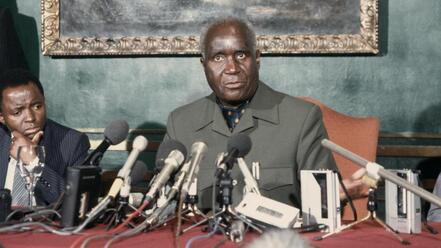 Bankrupting the Richest State in Central Africa The British left two Billion pounds in the state reserve bank at independence. It was not long before Kaunda’s socialist policies had bankrupted the country. Zambia became dependent on foreign aid and the importation of food. A Missionary Perspective on Zambia Under KK from Prison My first exposure to Zambia came on a mission in 1987 when I and three other Frontline missionaries were arrested for refusing to pay a bribe at Kazangulu Ferry. We travelled over pothole-ridden roads which had evidently not been maintained, or repaired, since independence 23 years before. We were imprisoned in filthy cells crawling with hoards of insects and myriads of cockroaches. The swarms of mosquitos soon brought us down with malaria. Those Who Profess Belief in the Goodness of Man Can Be Guilty of Inhumanity It was interesting that Kenneth Kaunda believed in “the goodness of man”, because much evil seems to be done by those who believe in the goodness of man. After a sleepless night in filthy cells in Livingstone, we were hooded, shackled, dragged at bayonet point and guided with rifle butts the over 580 km to Lusaka. There we were paraded through the streets and thrown into Lusaka Central Prison. 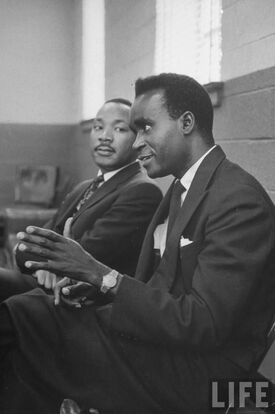 Contrasts with the Colonial Conditions The British built Lusaka Central Prison for 80 people. There were over 1,200 crammed in there by Kaunda’s government in 1987. When the British imprisoned Kaunda for nine months in Lusaka Central Prison back in 1955, he had a cell of his own, with a bed, sheets, desk, chair, couch, gramophone and three cooked meals a day brought to him. He also had electricity and plumbing as well as access to a library. Lusaka Central Prison When we were incarcerated in Lusaka Central Prison in 1987, there was no electricity, no plumbing, no sanitation and each cell had 55 to 65 prisoners crammed into 15 feet by 25 feet rooms. There was no air flow. The corrugated iron roofs made the heat stifling. The only ventilation came from a 1-foot square hole in the barred door. There were no beds or furniture. Prisoners simply had to lie on their side stacked in line like sardines. People died in the cells and were dragged out in the day time. The whole prison was a stinking disease factory. Disease and death were a constant reality in prison. We saw corpses being carried out of the cells. We were locked in our cells from sunset to sunrise, but were allowed to walk around the dirty, overcrowded yard during the daylight hours. Most Were Remand – Still Waiting for Their Day in Court Most of the prisoners were not convicts, but were remand, awaiting trial. Some claimed to be awaiting trial since 1984 and even before that. 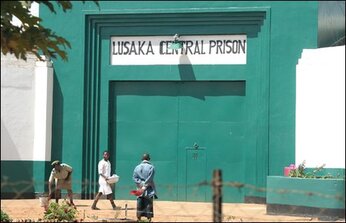 Detained at the President’s Pleasure We were placed in cell eleven, the presidential detainee’s cell. In our cell were people literally from around the world. There was a tall Muslim from Timbuktu in Mali, a man from Zaire, another from Kenya and one from Zimbabwe. There was a young man from Malawi, accused of spying for South Africa. There was also a highly-educated engineer who used to be a major in the Zambian army. A 62-year-old Indian citizen was also in detention without trial. This father of five, was in jail in spite of being a millionaire, or maybe because of that. Officials were greedy for his mining company and so he sat in the presidential detainee cell. "Condemning the innocent or letting the wicked go, both are hateful to the Lord.” Proverbs 17:15 Detained Without Charge or Trial A young Black South African, Isaiah Moyo, had been jailed for 18 months. He was a truck-driver, with a wife and two children in Soweto. Isaiah had been framed by some ANC members(exiles) who owed him money. Rather than paying him back, it seemed to have been easier for them to accuse him of being a spy. No evidence was necessary at that time of the one-party dictatorship of Kaunda. Tortured Isaiah had been severely tortured at Lilayi Police Training Centre. He had been hung upside down with his head in a bucket of water whilst being sadistically beaten. He had been burnt with red-hot pokers and his body was covered with sores that swelled up with pus and burst. He had also been electrocuted. 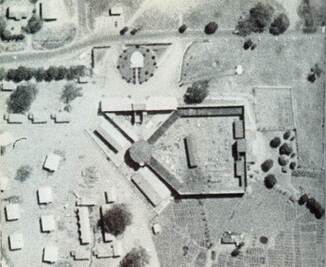 Singing in the Cells We had good fellowship with this fine Christian and spent hours each day on our knees in fervent prayer and in Bible study with him. At nights we would sing Christian hymns together. One night when we sang “Amazing Grace”, we heard choruses of singing coming from several of the other cells. “The Lord knows when our spirits are crushed in prison; He knows when we are denied the rights He gave us; When justice is perverted in court, He knows.” Lamentations 3:34-36 Interrogation Over the next two weeks incarcerated in this grossly overcrowded Lusaka Central Prison I went through 6 intense interrogations by officials of the Zambian Special Branch, Military Intelligence and the President’s Office. Prayer and Pressure Mobilised Internationally Thankfully, prayer and pressure was being mobilized worldwide on our behalf. Over a thousand calls were made to the Zambian embassy in Washington D.C. by concerned Christian supporters of our Mission. Representations were made to the Zambian embassy personally by related missions protesting our detentions. Over five hundred letters were sent to the British Foreign Office in London and the issue was taken to the Vancouver Commonwealth Conference and personally raised with the Zambian president by Prime Minister Margaret Thatcher. 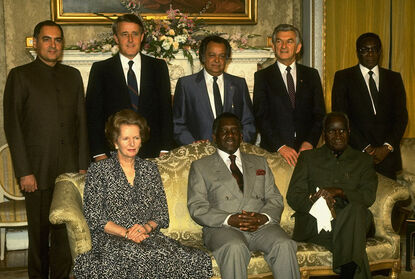 The Iron Lady Intervenes Friends of ours ensured that the British Prime Minister was informed of our plight just before her departure for the Commonwealth Conference in Canada (13-17 October, 1987). There, Zambian dictator, Kenneth Kaunda, chairman of the Frontline States, subjected Margaret Thatcher to haranguing over Britain refusing to place economic sanctions on South Africa. Margaret Thatcher Confront Kaunda Margaret Thatcher responded by asking why Zambia did not herself place sanctions on South Africa? KK responded that, that would place many people out of work. "Exactly", responded the Margaret Thatcher, "and as South Africa is one of our most important trading partners, many British citizens would be placed out of work if I were to impose sanctions on South Africa. Quite aside from the many South Africans themselves who would be placed out of work." Exposing Double Standards Margaret Thatcher then went on to relate how Zambians were dependent on South African maize grown in the Orange Free State, how Zambian Airways was maintained by South African Airways, how Zambian Railways was maintained by South African Railways, how South African veterinarians cared for Zambia’s cattle and how many Zambians were migrant workers in South Africa and a vital part of Zambia’s ailing economy. 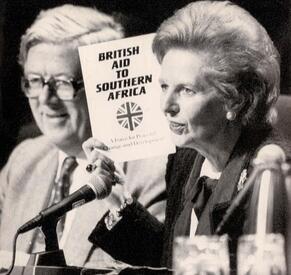 The Iron Lady Silences Kaunda and Secures Our Release KK then declared that because of South Africa’s human rights abuses, Britain should impose sanctions. It was at this point that Margaret Thatcher produced our information. "Who are you to speak about human rights abuses? You are the unelected dictator of a one-party state!" She challenged Kaunda. Four British missionaries are being held, without trial, as presidential detainees, in your overcrowded Lusaka Central Prison, tortured and abused by your own security forces! Kaunda was dumbstruck and humiliated. He ordered our immediate release. Overwhelming Opposition Forces Kaunda From Power By 1987 Zambia had the second highest debt of any nation in the world relative to its Gross Domestic Product (GDP). Rising opposition forced KK to allow a multi-party election in September,1991. Despite complete control of the mass media and massive propaganda campaigns, Kaunda’s UNIP was delivered a crushing defeat. Frederick Chiluba’s Movement for Multi-Party Democracy (MMD) won in a landslide with 75% of the vote. The Movement for Multi- Party Democracy The new president, Frederick Chiluba, had also been imprisoned in Lusaka Central Prison. His Vice President and later Minister of Education, General Godfrey Miyanda, became a friend of ours as a result of his incarceration in Lusaka Central Prison as a presidential detainee. It was General Miyanda who encouraged me to write the book Biblical Principles for Africa. 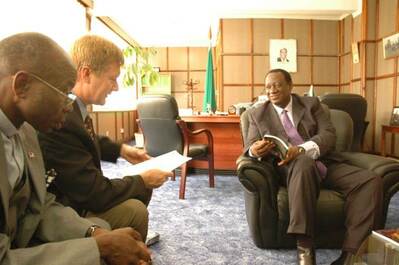 From Communism to Christianity Since 1991 I have been frequently invited to minister in churches and conferences, on radio and television throughout Zambia. The transformation from Kaunda’s socialist dictatorship to the free market, multi-party democracy, freedom of the press and freedom of religion of the MMD government was dramatic. President Chiluba committed Zambia to becoming a Christian country and entered an amendment to the constitution to that effect. Abortion was banned. Pornography prohibited. The Bible returned to the school classrooms. Chaplains replaced political officers in the armed forces. National days of prayer and repentance and thanksgiving were observed. Separating Myth from Reality in Eulogies for Dictators At this time, while many will seek to sing the praises of the previous dictator Kenneth Kaunda, some thought needs to be given for the long-suffering people of Zambia who endured 26 years of Kaunda’s misrule and oppression and the many victims of his autocratic rule. Remember the Many Victims One should also remember the many civilians killed by Marxist revolutionary terrorists hosted and supported by Kenneth Kaunda for their incursions into Angola, Mozambique, Rhodesia, South West Africa and South Africa. We All Have an Appointment It should also remind us that it is appointed unto man once to die and after that to face Judgement (Hebrews 9:27). Every knee will bow and every tongue will confess that Jesus Christ is Lord to the Glory of God the Father. 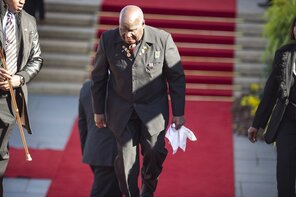 When Will You Bow to Christ? The question is not whether we will bow to Christ, but when we will bow to Christ. We can bow to Christ as Saviour and Lord today, in the day of grace, when the gates to Salvation are wide open. Or we can bow on the Day of Judgement, when the door to Heaven is firmly closed, when the day of grace is ended, to the eternal Judge. Is Jesus Your Saviour or Your Judge? Is Jesus Christ your Saviour and Lord? Or is He your eternal Judge? Dr. Peter Hammond Frontline Fellowship P.O. Box 74 Newlands 7725 Cape Town South Africa Tel: 021-689-4480 [email protected] www.FrontlineMissionSA.org www.ReformationSA.org See also: Frontline Team Jailed in Zambia Reformation in Zambia Reformation Report from Zambia Police, Preachers and Perseverance Other Articles on Zambia
0 Comments
Leave a Reply. |
Categories
All
Archives
October 2022
|
 RSS Feed
RSS Feed